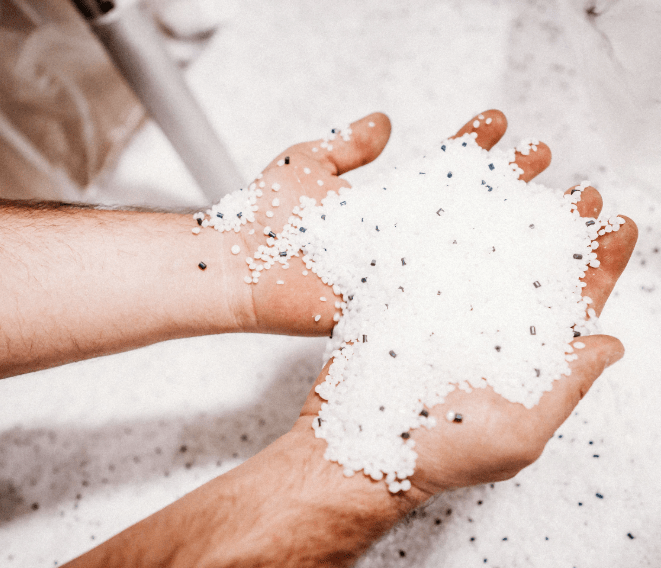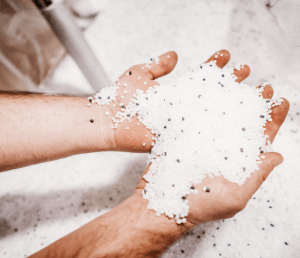Plastic injection molding is a popular manufacturing method because it enables mass production of components or entire products. With consistent results and excellent quality control procedures, this approach delivers exceptional outcomes for many diverse industries, from aerospace to consumer products.
The plastic manufacturing process creates reliable, high-quality parts through a streamlined and rapid process, making it an ideal method for companies that have high or complex production needs. Plastic raw materials undergo heating until they become a molten liquid. This liquid is then injected at high pressure into a pre-designed metal mold that forms the shape of the final product. The liquid plastic then cools and hardens into its final form before the mold ejects a completed part, clamps shut again, and repeats the process. Molding can produce sub-assemblies, individual parts, or ready-to-use products. It is different from compression molding.
Today, many industries benefit from thermoplastic resins and injection molding because these materials and processes support high-volume manufacturing of the business-critical parts and products that companies sell to their consumers.
7 Popular Injection Molding Applications
Plastic materials are a popular choice for both the parts required to create end products and for the end products themselves. Plastics are just as popular in the production of healthcare industry tools as they are in consumer goods like packaging or pet products — and for good reason. With so many different types of thermoplastics, like polycarbonate, nylon (polyamide), polyethylene, and many others, manufacturers across industries can select the appropriate material for their product or part.
Across industries, companies create essential products using the plastic injection molding process due to its high-volume capacity and its numerous material and design capabilities.
Automotive Industry
Injection molding is a popular choice for crafting many of the plastic parts and components required for vehicle production in the automotive industry. Vehicle manufacturers often rely on plastics for exterior parts, like bumpers, running boards, and windshield wiper covers, as well as interior parts, like dashboard items, buttons, switches, and cup holders.
Automotive manufacturers choose injection molding because it offers precision and durability. Injection molding allows for the repeated production of automotive parts to the same specifications — essential for sizable production runs of cars and other vehicles. Plastic is also much lighter than metal, contributing to material conversions that improve fuel economy by reducing the weight of a vehicle without sacrificing durability.
Consumer Goods Industry
Plastics are ubiquitous in consumer-facing applications. While many plastics go towards behind-the-scenes uses as components in larger consumer products, we handle many items every day that originated from an injection molding machine. Some examples include water bottles and plastic drinkware, plastic toolboxes, trays, packaging, children’s toys, and more.
Even many home kitchens feature a wide variety of injection-molded tools, from the plastic handles of kitchen shears to items such as spatulas and spoons. Food-safe plastics are among the many plastic material options that make it ideal for consumer applications. As plastic injection molding has the capacity to make a wide range of part geometries with the available lightweight plastic materials, the process is ideal for the consumer goods industry.
Healthcare Industry
In healthcare settings, reliable products aren’t just a matter of convenience; they can directly impact the quality of someone’s care. Plastic injection molding is found throughout healthcare, providing components and products for medical devices, hospital consumables, and many other items. Plastics are used for parts that make up a CPAP machine and the housings for monitoring equipment found in the ICU. The material’s high resistance to harsh chemicals makes plastic a good choice for environments that require repeated sanitization. Some plastics can also provide a non-porous medium that helps prevent disease spread in medical settings.
Electronics Industry
Plastic injection molding is very important to the technology sector. Plastics are often found in this industry as housing (or plastic shells) for many devices. Telephones, television remotes, and even car key fobs all use custom-designed housings made in an injection molding machine. Other technological use cases include connectors, cable conduits, Wi-Fi antennas, and more.
Injection molding is well-suited to this sector because plastics can withstand challenging conditions, including exposure to heat or chemicals. Many housings also require cutouts for buttons or switches; injection molding makes it easy to produce plastic parts with these cutouts available right out of the machine.
Construction Industry
In the construction and industrial sectors, plastics provide the innovative solutions necessary to foster the next wave of housing, commercial buildings, and commercial products. Construction vehicle production, especially parts like cranes, skid-steer loaders, and internal components, relies heavily on plastic injection molding. Housings and grips for handheld tools are also typical applications for injection-molded plastics. Plastic injection molding is vital for this industry, as it has materials that can withstand heavy-duty usage, violent impacts, and repetitive strain.
Defense Industry
Military and defense applications demand rigorous quality, dependable function and, often, rapid production. Plastic components find a home in many military applications that cross with other industries. For example, wheeled and tracked combat vehicle components can be similar to items in consumer automobiles. Injection molding also supports military-grade communications devices like aviation headsets or handheld radios. Components for weapons and scopes, flashlights, and other tools also use plastics.
Well-made plastic injection molds can achieve fine tolerances which, in turn, deliver items to military specifications. Additionally, the light weight of plastic can also improve military vehicles performance. Individuals working in military and defense roles will also benefit from lightweight but durable products. Thermoplastics offer the hardness and durability required for military applications and are a reliable tool in the manufacturing of essential military and defense components.
Aerospace Industry
Injection molding supports the aerospace industry in many of the same ways that it supports military and defense applications. Plastic injection molding is lightweight, replicable and can be used in complex geometric applications while adhering to advanced tolerance requirements. Injection molding is used for the production of jet turbine blades, chassis components, bezels, lenses, housings, and flight deck components like buttons, yokes, and more. Injection molding delivers the consistency required to ensure safety and compliance in an industry like aerospace.
Explore Injection Molding Applications Across Various Industries
While these seven examples highlight areas where injection molded parts are most popular, they do not represent the full scope of injection molding and its applications. Manufacturers across industries can rely on this manufacturing process for scale and high-quality outcomes.
Reliant Worldwide Plastics brings together decades of experience and cutting-edge equipment to deliver support from beginning to end. Our support services include:
- Part and mold design: The most critical part of the process, the mold design phase, sets the stage for later successes. Reliant provides design services and component design reviews to prepare your part for production.
- Prototyping: Once you’re happy with the designs, we can start rapid prototyping using technologies such as 3D printing. In our prototyping phase, we create small batches to see if the designs translate correctly into the physical world. Should the prototypes work as intended, we can move directly to manufacturing runs.
- Manufacturing: Depending on your requirements, we can assist with minor- or large-scale manufacturing runs. You can expect quick turnaround times and high-quality products.
Ready to start your injection molding project? Contact our team today for a quote.




